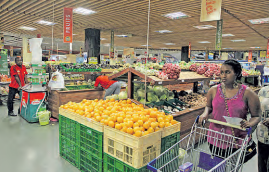

Selling prices for
various commodities rose fastest in
the last month of 2024, triggered
by a sharp increase in input costs,
marking it as one of the most expensive Christmas holidays.
According to the monthly Purchasing Managers’ Index (PMI) released on Tuesday by Stanbic Bank, the pick-up in cost burdens came as sustained growth in new orders and business activity prompted the fastest expansion in input buying for over two years.
This saw the overall PMI drop slightly to 50.6 points compared to 50.9 points recorded the previous month but was above the 50.0 neutral mark for the third month running.
Readings above 50.0 signal improved business conditions in the previous month, while readings below 50.0 show deterioration.
According to the report, the positive PMI reading was driven by three of its subcomponents: output, new orders, and employment all expanded for the third straight month.
“Notably, this marked the first full quarter of private sector output growth since the final quarter of 2021. Business output generally rose due to an increase in new order intakes, according to firms monitored by the survey,’’ the report reads.
New orders grew moderately, with the upturn easing from November.
Several panelists mentioned an improvement in purchasing power at customers, alongside new bookings and successful advertising campaigns.
Christopher Legilisho, economist at Standard Bank said PMI expanded further in December, albeit at a slightly weaker pace than in November, reflecting the continued resilience of the private sector following a challenging year.
“Positively, this is the first quarter of expansion in output since Q4, 2021, suggesting that the private sector is showing signs of turning around with new orders and employment also in expansionary territory,’’ Legilisho said.
According to him, Kenyan businesses reported increased passthrough of purchase prices and therefore raised their selling prices in December to protect their profit margins.
“Rising input and purchase price pressures are attributed to a further increase in demand for commodities and higher taxes, mainly in the agriculture and manufacturing sectors.”
On the macroeconomic front, Legilisho says the country ended the year with relative stability, a stable exchange rate, inflation at levels last seen 17 years ago, and interest rates declining for government.
“On the downside, private sector
confidence in the business outlook
for the next 12 months is still quite
weak,” Legilisho said.


